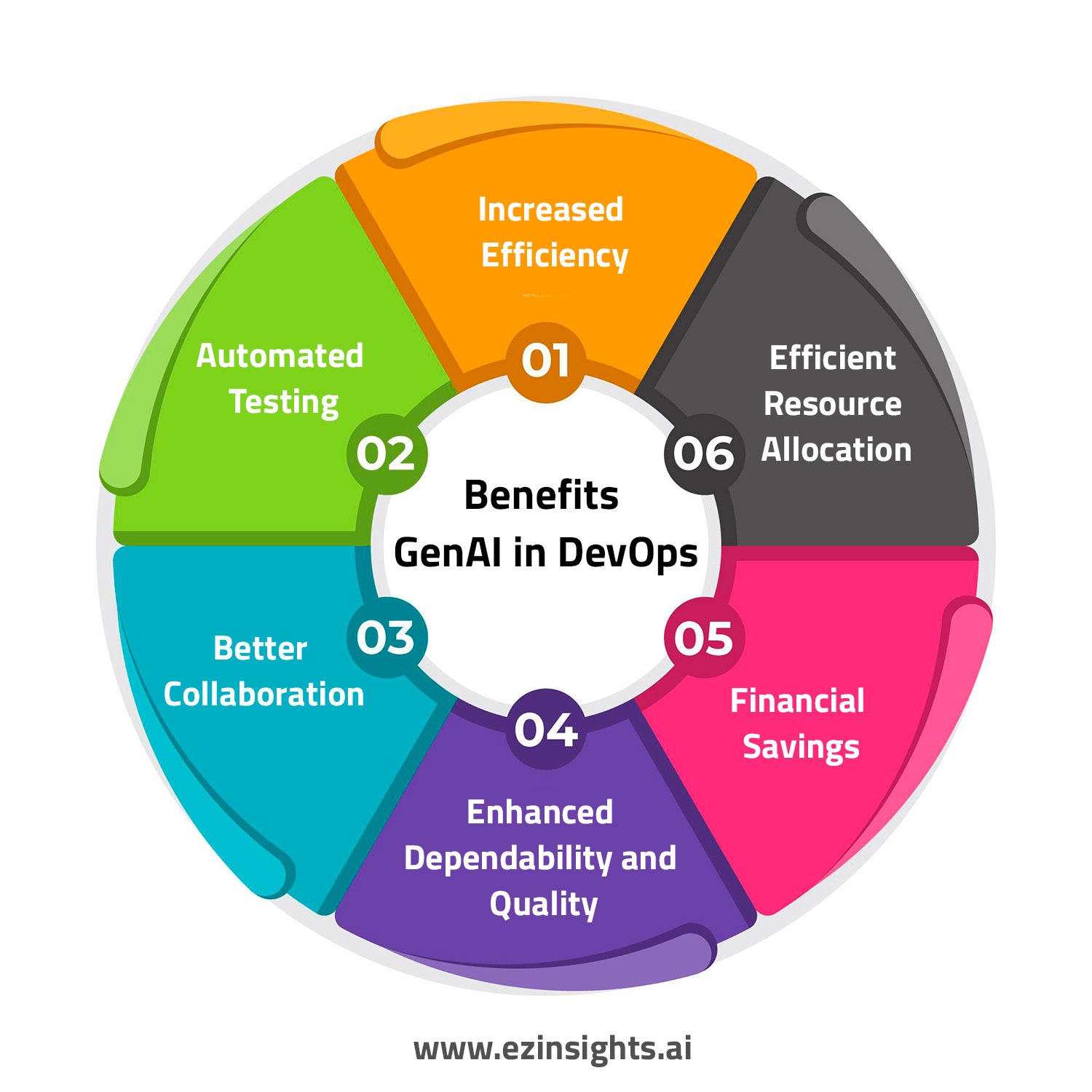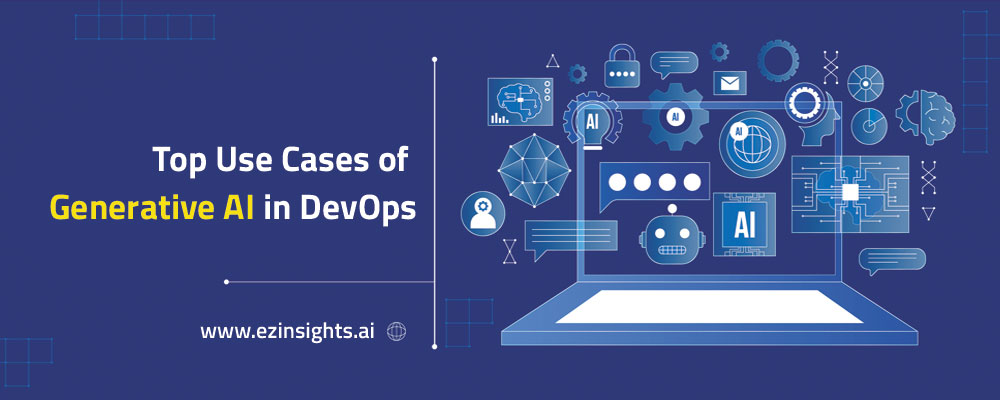DevOps has changed how software is developed and managed. It brings teams together, automates tasks, and speeds up delivery. This helps create better software faster, making it essential in today’s fast-moving digital world. DevOps also ensures smoother workflows, quicker updates, and more reliable applications.
Adding Generative AI to DevOps makes it even more effective. Generative AI and DevOps work together to simplify difficult tasks, offering smart suggestions, and generate new ideas. This combination boosts productivity that helps team to build and deliver software better and faster.
A McKinsey report shows that organizations using AI in their DevOps pipelines can cut deployment times by 30%. Companies that use AI for code generation and testing have seen a 50% reduction in bug-related issues. This combination speeds up development, improves software quality, and lets teams release updates faster. It also helps fix problems more effectively and enhances the overall user experience.
What is Generative AI?
Generative AI is a type of artificial intelligence that creates new content, ideas, or solutions by learning from existing data. Unlike traditional AI, which identifies patterns and makes predictions based on rules, Generative AI produces entirely new and original outputs. These can be text, images, music, videos, or even code.
Generative AI uses advanced machine learning models like Generative Adversarial Networks (GANs) or transformers. These models learn the structure of the data they are trained on. Once trained, they can generate content that mimics the original patterns but with a high level of creativity.
For example, in text generation, models like GPT-3 can write articles, create poetry, or generate dialogue from a prompt. In the visual arts, tools like DALL-E can generate images based on text descriptions. Generative AI is transforming industries by boosting creativity, automating content creation, and increasing productivity across many fields
What Is DevOps?
DevOps is a practice that brings together software development (Dev) and IT operations (Ops). It helps teams work together to deliver software faster and more reliably. The goal of DevOps is to automate tasks and improve collaboration.
In traditional development, the Dev and Ops teams often work separately. This can cause delays and errors. DevOps breaks down these barriers, allowing teams to work closely throughout the entire software lifecycle. It improves the development, testing, and deployment of applications.
With the help of automation tools and continuous integration (CI) and delivery (CD) pipelines, DevOps speeds up the development process. It also improves software quality and ensures faster releases. Ultimately, DevOps helps businesses stay competitive in a fast-paced digital world.
Benefits of Using GenAI in DevOps
Below are the 6 key benefits of integrating Generative AI into DevOps to enhance efficiency and productivity.

Increased Efficiency
Generative AI helps developers and operations teams to automate repetitive tasks and provide intelligent support. This frees up time, allowing them to focus on delivering business value, driving innovation, and solving more complex issues to boost overall productivity.
Automated Testing
Generative AI can generate diverse test cases based on different scenarios and user behaviours. This automation ensures more comprehensive testing that helps identify issues quickly and improve the reliability and stability of the software before it reaches end users.
Better Collaboration
AI-powered tools facilitate communication between development and operations teams by providing real-time insights, feedback, and automated reports. This improved collaboration ensures smoother workflows, quicker decision-making, and more efficient problem-solving, enhancing team synergy and performance.
Enhanced Dependability and Quality
Generative AI tools to help detect and fix bugs, vulnerabilities, and code issues early in the development process. This proactive approach ensures that the final product has fewer defects, improving overall software quality and reducing the risk of failures in the production process.
Financial Savings:
By automating time-consuming tasks like testing, bug fixing, and deployment, Generative AI reduces the need for manual labor. This results in lower operational costs and fewer resources needed to manage and oversee each stage of the development process.
Efficient Resource Allocation:
By analyzing patterns in resource usage, AI can optimize the allocation of computing resources in real-time. This leads to better management of cloud resources, reducing costs and ensuring that the infrastructure is used efficiently for optimal performance.
Gen AI DevOps Use Cases
Below is an in-depth exploration of key use cases where Generative AI excels in revolutionizing DevOps workflows:
Automated Code and Script Generation:
Generative AI tools create boilerplate between code and scripts for accelerating development. They suggest syntax, functions, and templates, helping developers to focus on complex logic while reducing errors and repetitive coding tasks.
Continuous Integration/Continuous Deployment (CI/CD) Optimization:
Generative AI reorganizes CI/CD pipelines by automating build, test, and deployment workflows. It identifies bottlenecks, optimizes processes, and ensures faster releases with fewer manual interventions to enhance overall software delivery efficiency.
Intelligent Infrastructure as Code (IaC) Management:
AI automates IaC creation and validation and reducing manual configuration errors. It generates optimized scripts for cloud infrastructure deployment, ensuring consistency, scalability, and efficient resource provisioning across environments.
Real-Time Log Analysis and Incident Response:
Generative AI analyzes application and system logs in real time and detects anomalies while providing actionable insights. This rapid detection reduces downtime and enhances incident response times while ensuring a reliable application performance.
Performance and Cost Optimization:
Generative AI monitors system performance and resource usage and offers dynamic recommendations for scaling and optimization. This ensures efficient resource allocation minimizes costs and improves application performance under varying workloads.
Security and Compliance Automation:
AI scans code and configurations for vulnerabilities to ensure security and compliance standards. It provides real-time alerts with actionable fixes to reduce risks while enhancing application security and governance.
Intelligent Monitoring and Alerting:
Generative AI tracks application performance and identifies potential issues while sending contextual alerts. It reduces noise by prioritizing critical incidents and enables teams to resolve problems quickly to maintain system reliability.
Knowledge Management and Documentation Automation:
AI generates and updates documentation automatically. It converts complex workflows into easy-to-read guides. This reduces the time spent on manual documentation and ensures up-to-date and comprehensive knowledge-sharing across teams.
Enhanced Collaboration and Decision Support:
Generative AI facilitates collaboration by providing real-time insights and recommendations. It consolidates data from multiple sources to support informed decision-making and ensure seamless communication between development and operations teams.
Release and Deployment Management:
AI-driven tools automate the release process by managing deployment schedules and rollbacks. By reducing human error and ensuring consistency, Generative AI enables smoother and faster deployments with minimal disruption to production environments.
Conclusion
Generative AI is a game-changer for DevOps, driving efficiency and innovation across the board. From automating repetitive tasks to enabling predictive insights, it transforms how teams build, deploy, and maintain software systems.
As DevOps continues to evolve, the integration of generative AI will not only enhance operational efficiency but also open new avenues for creativity and problem-solving. By embracing this technology, organizations can stay ahead in the competitive landscape.
Register today for EzInsights and get a free trial to experience the power of Generative AI in your DevOps workflows.
FAQs
What is Generative AI in DevOps?
Generative AI in DevOps refers to the integration of artificial intelligence tools that automate tasks, generate code, optimize processes, and provide predictive insights, enhancing the efficiency, reliability, and speed of software development and deployment.
How does Generative AI improve software deployment in DevOps?
Generative AI streamlines deployment by automating repetitive tasks, detecting potential issues early, optimizing configurations, and reducing human errors. It accelerates deployment timelines, improves code quality, and ensures smoother, more reliable software releases.
Can Generative AI reduce the cost of DevOps processes?
Yes, Generative AI helps lower costs by automating manual tasks, optimizing resource usage, and identifying inefficiencies. It allows teams to focus on high-value activities while reducing errors and unnecessary resource consumption, leading to cost savings in the long run.
How do I get started with Generative AI in DevOps?
To get started, integrate AI-powered tools into your CI/CD pipelines, infrastructure management, and testing workflows. Register for platforms like EzInsights to explore Generative AI capabilities through a free trial and gain hands-on experience.

Anupama Desai
President & CEO
Anupama has more than 23 years of experience as business leader and as an advocate for improving the life of the business users. Anupama has been very active in bringing business perspective in the technology enabled world. Her passion is to leverage information and data insights for better business performance by empowering people within the organization. Currently, Anupama leads Winnovation to build world class Business Intelligence application platform and her aim is to provide data insights to each and every person within an organization at lowest possible cost.

